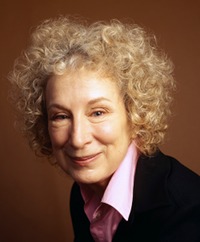COMMENT: Margaret Atwood should not have accepted Tel Aviv prize
Novelists Amitav Ghosh and Margaret Atwood have accepted the Dan David prize at Tel Aviv University, an institution at the heart of Israel’s military-industrial complex. By doing so they have spurned Palestinian civil society’s call for boycott, divestment and sanctions on the Zionist state. Atwood has specifically ignored this wonderful open letter from the students of Gaza. The shared prize money amounts to a million dollars, of which 10 percent will be handed back to support Tel Aviv’s graduate students.
Of course it would be a mistake to expect writers to attain to higher moral standards or to to display more political intelligence than anyone else. Two things stick in the craw in this case, however. The first is that both Ghosh and Atwood have made names as ‘progressive’ and ‘postcolonial’ writers. We aren’t surprised when an openly-declared Zionist like Martin Amis visits Israel, but when writers who sell books on the basis of their opposition to oppression visit, the resultant hypocrisy is quite nauseating.
Atwood is supposedly a feminist writer. (Helena Cobban notes, however: “all of her novels are about women trapped in helplessness.”) I wonder what Atwood would say to the struggling women of Palestine – the poets, journalists, protestors, stone throwers, organisers, the widows and bereaved mothers – were she to meet them. But she won’t meet them. They aren’t sipping wine at the Tel Aviv reception; they are locked up in their ghettoes and mourning their dead. They are wondering how to educate their children when their children don’t have enough to eat, when they can’t find pencils in the market, when the local school is a smouldering pile of debris.
The second thing in our craw is this: Not only did Atwood and Ghosh choose to accept the cash, they used the occasion to launch a diatribe against the BDS strategy. I didn’t want to publicise their screed by linking to it, but I will, because it makes our argument for us. For a start, it could have been written by any half-conscious sixteen-year-old, so poor it is in both style and logic.
Ghosh and Atwood imply that the boycott is self-righteous and propagandistic. On the other hand,
the novel is a creature of nuance: of perhaps, of maybe. It concerns itself, not with gods and demons, but with mortal people, with their flawed characters, their unsatisfactory bodies, their sufferings, their limited and often wrong choices; with the dubiousness of their own actions and the unfairness of their fates. … Writing a novel often requires you to see life through the eyes of those you may not agree with. It is a polyphonic form. It pleads for the complex humanity of all human beings. … Worldwide, novel-writing is under constant pressure, both from political groups who want to co-opt it, and from powerful governments who’d like to silence it. Around the world, novelists have been shot, imprisoned, and exiled for their failure to toe somebody else’s line. But they continue to write stories.”
The tone of wounded nobility intensifies:
Writers have no armies. They have no militant wings. The list of persecuted writers is long, ancient, and international. We feel we must defend the diminishing open space in which dialogue, exchange, and relatively free expression are still possible.”
This is what I meant by the half-conscious sixteen-year-old. On the surface, to someone with little experience of life and of the abuses of language, the freedom rhetoric sounds admirable. But the assumptions on which the rhetoric rests are thoroughly dishonest. Who in Palestinian civil society or the international BDS movement is calling for an attack on ‘polyphony’ or pluralism? Surely the battle against Zionism and for civil rights is a battle on behalf of pluralism, for a plural Palestine-Israel built on equality. Does acting against the seige, the ethnic cleansing, the apartheid mean not seeing things through the eyes of those you disagree with? Atwood opposed South African apartheid – did this result in an inability and unwillingness to understand the fears and hopes of white South Africans? Would a boycott of Nazi Germany have signalled an unreasoning, narrow-minded hatred of Germans?
Or is it that certain racisms, certain colonial-settler projects, are more acceptable than others?
Appallingly, our two heroes associate themselves with writers who have been shot, imprisoned and exiled. In the context, this is analagous to Nixon identifying with a napalm victim. Have Ghosh-Atwood not heard of the millions of Palestinians in exile, in refugee camps, among them many writers? Have they not heard of Ghassan Kanafani, who would have been one of the world’s greatest literary figures had he not been murdered by Zionists as he was growing into his prime? Have they not heard of Mohammed Omer or any of the other journalists tortured and imprisoned and prevented from travelling by the apartheid regime?
The great principle our valiant postcolonialists claimed in Tel Aviv was “keeping doors open.” In other words, communication. Engagement. Dialogue.
Let’s put to one side the simple fact that the Palestinians experience only the dialogue of occupation (which seems rather like a monlogue to me). Let’s focus instead on the mendacity of the Ghoshwood assumption. If writers wish to communicate with Israel they can write articles in newspapers and magazines. They can write books. They can read articles and books written by Israelis. They can telephone Israel, or chat with Israel on the internet. Nobody is asking them not to. The BDS strategy is in itself an act of communication. Ghoshwood could have written an open letter to Israeli newspapers explaining that they would not accept the prize until Israel transformed itself from an apartheid state and ended its illegal occupations. You can bet that communication would have been much more widely heard than the ridiculous Tel Aviv speech.
This article originally appeared on Qunfuz. Reprinted with permission.

























